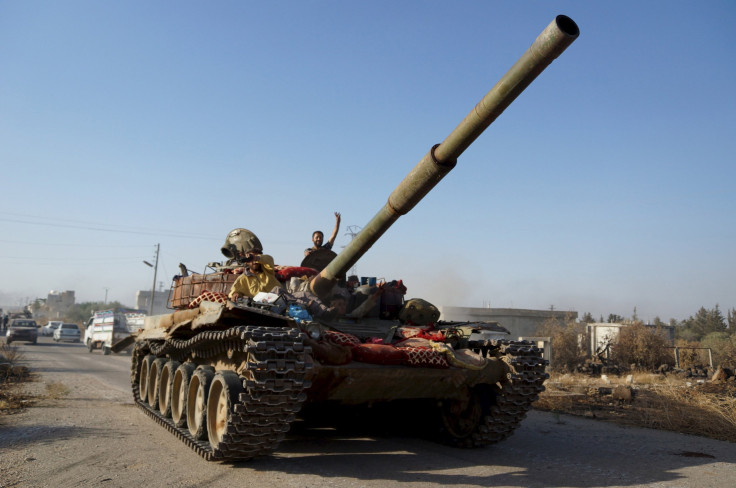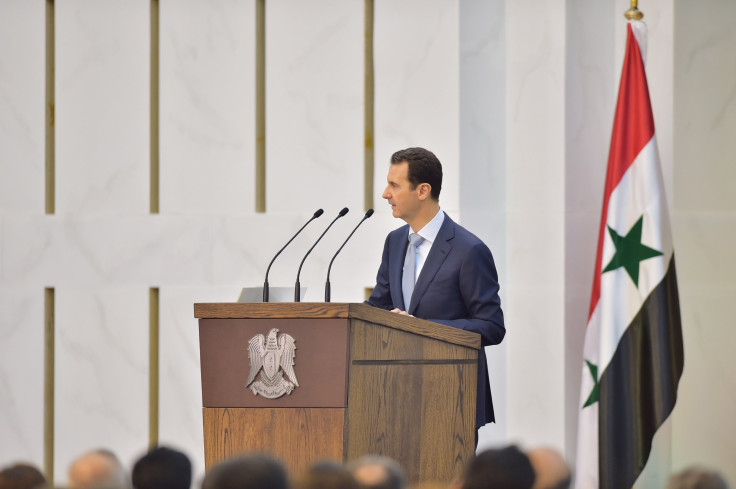How Turkey Border Zone Could Help Syrian Rebels Obtain Weapons, Cash To Fight Assad

Rebels in Syria are counting their stockpiles of ammunition, weapons and tanks in the northern city of Aleppo, the country's second-largest city and one of the largest battlegrounds in the fight against the Islamic State group and President Bashar Assad's forces. As usual, the rebels are running low this month on supplies needed to defeat their enemies. Even for some of the strongest and best-connected units in northern Syria, finding and obtaining simple resources like bullets and Kalashnikovs can take weeks.
That could all change in the coming days when the United States and its NATO allies move forward with a proposed offensive to create a "safe zone" aimed at pushing back Islamic State group militants from the Syrian-Turkish border. For rebel groups, the promised campaign represents an unprecedented opportunity to obtain much needed-cash and weapons. But for the U.S. and Turkey, the countries spearheading the operation, there is a risk that the weapons they supply will end up in the hands of rebels who have a different goal -- fighting Assad first, not ISIS.
Under the plan, Turkish troops and Syrian rebel fighters are to clear a 60-mile strip of land along the border to create a haven for Syrian refugees, who have flooded Turkey's borders during the four-year civil war. The U.S. and Turkey will rely on rebels on the ground to secure the buffer zone. The rebels are supposed to get regular shipments of ammunition and heavy weaponry to ensure that the Sunni militants known as ISIS stay out of the area.
Kurds cry foul over plan for Turkey buffer zone in Syria http://t.co/z5fdSYo6TY pic.twitter.com/lCidD15SUc
— The Times of London (@thetimes) July 28, 2015That process, though, could go awry quickly. The rebels receiving the arms for securing the buffer zone will undergo no formal training and will not be bound to any official or binding agreement with the U.S. and Turkey. Rebels in Aleppo say that while they are willing to join the buffer zone monitoring force, they fully intend on using the weapons they receive from the U.S. and Turkey for their fight against Assad first and foremost, before the fight against ISIS.
"This is what we have been asking for for years. This is what we wanted," a member of one of the largest rebel umbrella organizations in the country said on condition of anonymity. "We have been asking for weapons for years, and we finally have a good chance of getting them."
Taking out Assad is not an immediate concern for the U.S. It wants to defeat ISIS first. Turkey, on the other hand, supports the rebel groups that see Assad as the real enemy.
In recent years, Turkey has funded groups like Ahrar al-Sham, a Sunni Muslim extremist group with ties to al Qaeda, and has pushed for the ousting of Assad before ISIS. The Turkish government has also taken part in the shipment of arms to rebels in Syria, Reuters reported earlier this year.
In contrast, the U.S. has rejected cooperation with Ahrar al-Sham and other extremists, instead preferring to work with so-called "moderate rebels." The U.S. has also promoted an ISIS-first strategy, which has angered some rebels who argue that Assad is the true enemy and must be taken out of power before the Islamic State can be toppled.
Rebel groups in Syria, especially in the north, are split in their allegiances to Turkey and the U.S., and finding a rebel force with a common ideology and strategy to carry out the monitoring of the buffer zone will be difficult, rebels in Aleppo told International Business Times Monday. The weapons, they said, will end up falling into the hands of groups that have different ideologies and ultimate goals.
While many rebel leaders used to fall under one umbrella group, the Free Syrian Army, they have recently split and are now duking it out for land and power. There are the hardline Islamist fighters with known battlefield strength, but an extremist Muslim ideology. Then there's the more moderate groups known for their popularity among the people of Aleppo, who while still devoutly Muslim, do not want the implementation of Shariah law in the post-war era.
In an effort to get the U.S. weapons for the buffer zone mission, extremist fighters who make up Ahrar al-Sham, one of the main Islamist rebel groups, say they have tried to promote themselves as a more moderate organization, one willing to work with other groups toward a peace process. But in the end, they say, the weapons they receive will be used for one goal.
"Ahrar al-Sham wants to see the end to Assad's reign," wrote Labib Al Nahhas, foreign affairs director for Ahrar al-Sham, in the Telegraph this week. "Assad and his cabal of murderous generals must go."
Al Nahhas also warned the U.S. against attempting to bring Western values to Syria. "Political systems and models of government cannot be imported into the Middle East and expected to flourish where historical experiences, political cultures and social structures are so radically different. There needs to be a major role for religion and local custom in any political arrangement that emerges," he said.

Other rebel leaders, including some who were once trained and given weapons under a CIA covert operation against Assad in 2013, have called the safe zone operation a "sham." In the spring of 2013, the U.S. selected groups within the Free Syrian Army for a program that allowed for the transfer of U.S.-made weapons to Turkey via other countries' aircraft.
One senior rebel leader in Idlib, a major rebel stronghold in the southwest of Aleppo, insisted the West had failed them before and "will fail us again." The United States is "sitting on its heels" in seriously attacking Assad because it does not want to engage in armed conflict with the dictator's allies, Iran and Russia, he added.
Still, the appeal of helping the United States and Turkey fight ISIS is clear to many rebel leaders, who expect the offensive to bring in loads of cash and weapons, resources they have needed desperately amid a four-year battle to unseat Assad.
"We think that President Obama threw the Syrian opposition under the bus," Mohammed Ghanem, a senior political adviser in Washington at the Syrian American Council, a grassroots organization based in Chicago, told IBTimes in November. "Given how abysmal the situation is in Syria, that seems like a bad joke."
© Copyright IBTimes 2025. All rights reserved.





















